One year on from the EU referendum, it's become clear that the EU will decide the Brexit deal for us
The real challenge facing this vulnerable government is agreeing the egregious Brexit 'divorce bill', which could be as much as £85bn


No matter which way we voted on the 23 June 2016, on the anniversary of the vote to leave the European Union we must accept not only that the process of Brexit started on 29 March, but that raking over the past will not bring us a more stable future.
But let’s not also deceive ourselves into believing that no deal is better than a bad deal. Leaving the EU with no deal would be a disaster for our economy, for our future prosperity, for our jobs, for everyone’s standard of living and the futures of all our children. Philip Hammond has said he doubts the UK will have fully left the EU until 2023 to avoid a “cliff edge”. The reality of the complexity of executing a too-simple binary “yes or no” vote is dawning.
But the dawning I would like to see is one of honesty in respect of Brexit, from all political parties. If you were in any doubt about how weak our hand is, just look what happened on 19 June. In the very first round of negotiations David Davis immediately accepted the European Commission’s proposals that the divorce settlement, the status of EU nationals in the UK and the border between the UK and Ireland all had to be resolved before there could be a discussion about the future arrangements.
This was what David Davis had proudly proclaimed would be the “row of the summer”. In fact, it scarcely lasted a day.
On 20 June the Society of Motor Manufacturers and Traders (SMMT) said the UK was highly unlikely to reach a final agreement with the EU by the March 2019 deadline – which would mean car makers could face a “cliff edge” as tariff-free trade was sharply pulled away. The motor manufacturers warned that they doubted the UK would have a trade deal agreed by the 2019 deadline and they would suddenly face massive tariff barriers being put in place.
An EU27 European Council meeting on Brexit took place after a working dinner on 22 June, at which the issue of Brexit was allocated just one hour, and at which all EU member states except the UK participated. As well as discussing the state of play of EU-UK negotiations on Brexit, the decision was made that the European Banking Authority (EBA) would move from the UK to Frankfurt and the European Medicines Agency (EMA) would move to Lille after Brexit. The almost clinical swiftness and efficiency with which these “carve-ups” are being decided should make us all very wary of the kind of outcome occurring.
So, let’s not kid ourselves that a red, white and blue Brexit, a hard or soft Brexit or an open Brexit is anything other than a Brexit which the EU27 will decide and deliver to the UK as an ultimatum – that we either take or leave.

Yet in the face of these realities, political fantasies continue. Proclaiming a win on EU citizens’ rights and reciprocal rights for UK citizens living abroad, which was never going to be used as a bargaining chip by either side, is illusionary. The reality is that “UK settlement status” without rights of adjudication to the European Court of Justice could pose a problem. The real challenges facing this vulnerable government is agreeing the egregious Brexit “divorce bill” which could be as much as £85bn to meet outstanding obligations after Brexit, and settling the Irish border issue by the end of October.
Some of the most urgent issues today are not simply Brexit-based but the domestic political fractures caused by Brexit. Labour, the SNP and the Lib Dems are alleged to be plotting to use the debate on the Queen’s Speech to topple the Government. They intend to table an amendment to the Queen’s Speech demanding easier access to the single market and a cross-party Brexit Commission. This is the very same pragmatic approach I proposed last year, as I believe it would be one that puts our country above party politics to reach a broad consensus on the terms of Britain’s withdrawal.
The last time a sitting government was defeated over a Queen’s Speech was in 1924. As it was then, this outcome would be fatal to the PM’s authority and the Brexit negotiations. The question is therefore, how many more Brexit anniversaries and how much more uncertainty will the UK face before politicians come clean on what Brexit really means?
Gina Miller is a businesswoman and transparency activist
Join our commenting forum
Join thought-provoking conversations, follow other Independent readers and see their replies
Comments
Bookmark popover
Removed from bookmarks